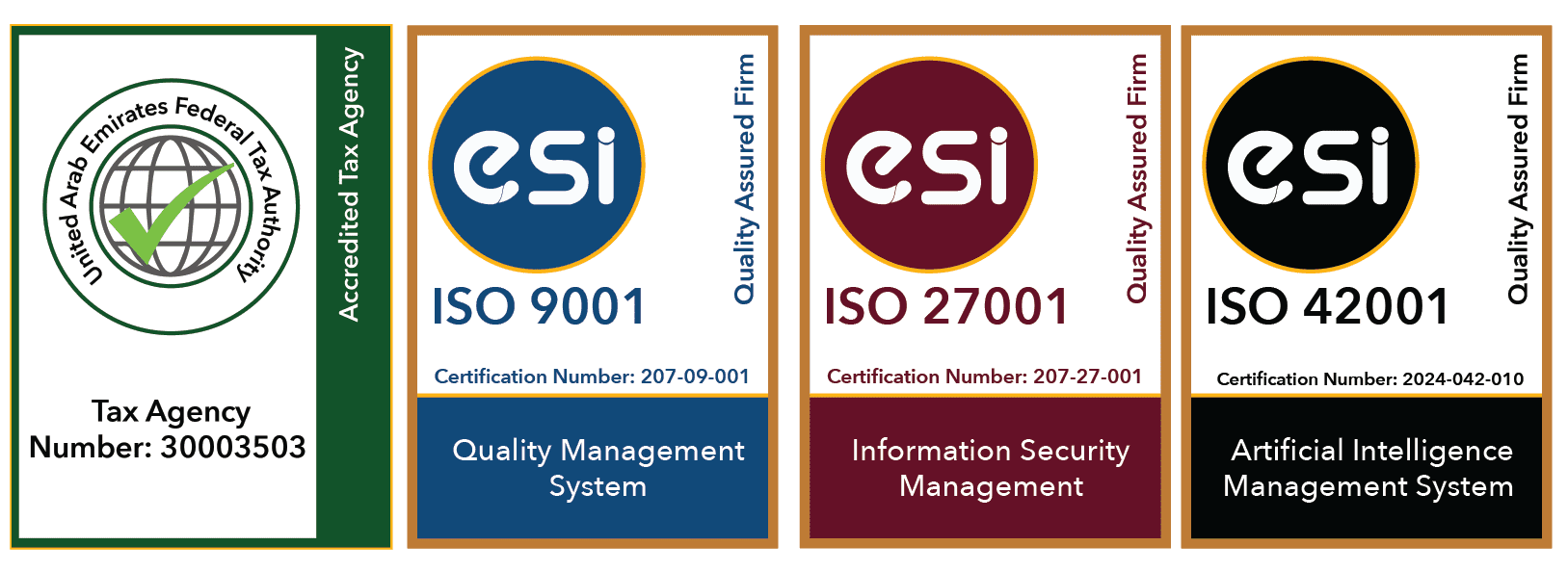UAE Free Zones: Understanding Tax-Free Exemption Rules and Compliance
09 August, 2024 / Haroon Juma / Corporate Tax

The UAE is reknown as a global and regional business hub that offers fast and efficient access to markets, world-class infrastructure and benign tax environment to operate a business. A key driver in creating the country’s economic growth are UAE Free Zones. They have played a key role in promoting this favorable business environment through offering 100% ownership, reputable governance, tax-free exemptions and a wide ecosystem to support key sectors from international trading, crypto mining to e-commerce companies.
Operating a Free Zone is a good option for many businesses. With over 40+ free zones across the UAE, the options are broad. All have specific benefits and legislative options such as legal and labor rules. Nevertheless all free zones fall under key elements under the Federal Law and understanding the tax-free exemption rules and managing compliance effectively is crucial for businesses operating in UAE zones.
Overview of UAE Free Zones
UAE Free Zones are special economic regions separately governed from mainland UAE rules designed to attract foreign investment by offering favorable business conditions. There are over 40 Free Zones across the UAE, each catering to different industries, including technology, finance, media, and logistics. Each offers governance and legislative provisions to operate a specialised business. However they are subject to the same rules under the Federal Laws governing both VAT (introduced in 2018) and Corporate Income Tax (introduced in 2022).
Tax-Free Exemption Rules
One of the most appealing aspects of UAE Free Zones are the tax benefits they offer. These include:
- Corporate Tax Exemption: Until the introduction of Federal Decree-Law No. 47 of 2022 on the Taxation of Corporations and Businesses (CT) Law has been published as of 9 December 2022, all businesses operating within Free Zones were exempt from corporate taxes for a specified period (dependent on Free Zones), typically ranging from 15 to 50 years, with the possibility of renewal.
- Personal Income Tax Exemption: As with all UAE derived personal salary income, employees working in Free Zones are not subject to personal income taxes.
- VAT Exemption: Goods imported and exported from Free Zones are exempt from VAT, facilitating trade and reducing costs for businesses. Not all Free Zones are eligible and the applicable Free Zones are defined “Designated Free Zones”.
- 100% Foreign Ownership: Unlike the mainland UAE, where foreign ownership is often limited to 49% for specific types of activities, Free Zones allow 100% foreign ownership, giving investors complete control over their businesses.
Corporate Tax and Free Zones
The introduction of the UAE Federal Corporate Tax Law, which came into effect on June 1, 2023 imposes a standard corporate tax rate of 9% on on all UAE businesses (including free zone companies) with business profits exceeding AED 375,000.
While Free Zones have offered tax incentives, it is important to note the broader UAE corporate tax law has material effects on corporation tax rates in the Free Zones and they can continue to benefit from corporate tax exemptions if they qualify and meet certain conditions:
- Qualifying Income: The nature of the income generated is a key factor to assess qualification for an exemption. Income derived from qualifying activities within the Free Zone or with other Free Zone entities may qualify for tax exemption. Your business must assess the nature of your income generating and activity and whether it meets the specific criteria for qualifying income to ensure compliance.
- Non-Qualifying Income: Income generated from mainland UAE activities or certain non-qualifying activities may be subject to the standard corporate tax rate. This also must meet the Des Minimus rules for maintaining the tax-free exemptions. As a result, usinesses must segregate their income streams to accurately meet compliance rules.
- Transfer Pricing Rules: The UAE’s corporate tax law includes transfer pricing rules aligned with OECD guidelines. Qualifying Free Zone businesses must ensure that transactions with related parties are conducted at arm’s length and properly documented to maintain Qualifying Free Zone Person status and exemption.
- Economic Substance Regulations (ESR): Compliance with ESR continues to remain crucial for Free Zone businesses in meeting Substance rules. Failure to meet these requirements could result in loss of tax benefits.
- Free Zone Selection: Specific qualifying activities are subject to being resident in certain free zones that offer key operating and legislative governance. Therefore, not all free zones will be able to offer exempt status.
Addressing Economic Substance for Free Zone Exemption
A key element to benefit from tax exemptions in UAE Free Zones is meeting the Substance requirements. Businesses must demonstrate adequate substance supporting economic activities within the UAE and from the free zone. Substance can broadly be achieved by meeting the below conditions:
- Core Income-Generating Activities (CIGA): Ensure that core income-generating activities are conducted in the UAE and from the free zone. This includes ensuring management is employed by UAE company, have ability and qualifications to operate the company, making key decisions, taking on and managing risks, and performing significant business functions within the Free Zone. The manager should also be physically operating the company in he UAE to ensure residency rules are met.
- Adequate Physical Presence: Maintain an adequate physical presence in the UAE and within the free zone, which includes sufficient office space, equipment, and other operational infrastructure to support the business’s activities.
- Qualified Staff: Employing a sufficient number of qualified full-time employees in the UAE who are actively engaged in the business’s core activities. The number of employees should be proportionate to the level of activities carried out.
- Operational Expenditure: Incur adequate operational expenditure in the UAE to demonstrate conducting substantial activities within the UAE. This includes expenses related to rent, salaries, utilities, and other business operations.
- Board Meetings: Hold board meetings with a quorum of directors physically present in the UAE. The minutes of these meetings should be properly recorded and maintained as evidence of substantial activities.
- Documentation and Reporting: Maintain detailed records and documentation of all economic activities conducted within the UAE. This includes minutes of meetings, contracts, financial records, and other relevant documents that demonstrate compliance with ESR requirements.
Compliance Management under UAE Law
While the tax-free incentives are important, Free Zone rules oblige businesses to adhere to specific compliance requirements to maintain their status. The can include:
- Regular Financial Audits: Free Zone companies are often required to submit annual audited financial statements sibject to the articles of incorporation under each free zone. Regular audits help ensure accuracy and transparency in financial reporting.
- Adherence to Employment Laws: Companies must comply with UAE labor laws, including visa regulations, employment contracts, and worker benefits. Free Zones often have specific guidelines, and some free zones adopt mainland procedures such as the Wage Protection System (WPS).
- Economic Substance Regulations (ESR): Introduced in 2019 to align with international tax standards, ESR requires businesses to demonstrate “substance” to support economic activities within the UAE. Companies must file annual ESR notifications and reports to comply with these regulations.
- Anti-Money Laundering (AML) Compliance: As of 2019 DNFBPs (wider sectors of the economy) are obliged to implement robust AML policies and procedures to prevent illicit financial activities. This includes conducting customer due diligence, maintaining transaction records, and reporting suspicious activities.
- Staying Updated with Free Zone Authorities: Each Free Zone governed by its regulatory authority, which sets specific compliance requirements. Regular communication with these authorities will ensures better awareness of any changes in regulations or compliance expectations.
Best Practices for Compliance Management
A range of best practice options are recommended to ensure a free zone business meets and benefits from all eligible incentives. As a guide, a free zone company can :
- Hire Compliance Experts: Working with experts such as SimplySolved. who are well-versed in UAE Free Zone regulations, can help businesses navigate complex legal requirements.
- Training and Awareness: Regular training sessions for employees on compliance requirements and best practices foster a culture of compliance within the organization.
- Utilizing Technology: Implementing software can streamline processes such as record-keeping, reporting, and monitoring compliance status.
- Proactive Monitoring: Establishing an internal audit function to conduct periodic reviews of compliance processes can help identify and address potential issues before they escalate.
Conclusion
UAE Free Zones offer lucrative tax-free incentives that can significantly benefit businesses. However, maintaining compliance with UAE laws and Free Zone regulations is essential to fully enjoy these benefits. By understanding the impact of the UAE’s corporate tax law and implementing robust compliance management strategies, your business will be in position to operate effectively and benefit from all available reliefs.
Accounting & Tax Services
As an approved FTA Tax Agency, SimplySolved supports businesses under advisory or complete outsource basis to optimise, manage and discharge tax obligation in the UAE. Our experts possess in-depth knowledge of the UAE tax regulations and can guide you through the intricacies of the UAE Corporate Tax Law.
By leveraging our expertise, you can streamline the process, saving time and minimizing the risk of errors. This proactive approach ensures that your Tax matter are handled efficiently, allowing you to focus on your core business activities.
Simply Solved is an ISO 9001 & 27001 certified company and a registered FTA Tax Agency. Our team of experienced consultants and tax agents provides high-quality, cost-effective services for all Tax matters for companies of all sizes.

About SimplySolved
At SimplySolved, we save your time, resources, and costs. Whether you need help with Outsourced Accounting, Finance, Corporate Tax, Employee Management & Payroll and ERP & E-Commerce Integration. we have the expertise and solutions to help.
Subscribe to mailing list
Partner With SimplySolved
Serving over 300+ clients we know the challenges your business faces operating cost effective, compliant and efficient back office operations.
As an FTA Accredited Tax Agency with ISO 9001 Quality & 27001 Information Management Certification, we offer a quality-based approach to our services supported by dedicated team of certified professionals.
We support our clients with defined processes, platforms and expertise to deliver advisory, project and outsourced services in Accounting, Tax, Auditing, HRM & Payroll & ERP solutions. Our offerings are specially designed to meet the UAE Regulations to put you in control of your information, comply to the legislation and help you make better business decisions.
Copyright © 2024 | SimplySolved | All Rights Reserved.




